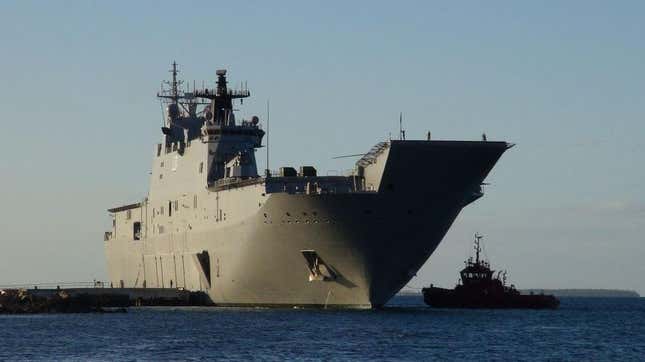
The aid effort to help volcano- and tsunami-stricken Tonga is running into a covid-19 roadblock.
The HMAS Adelaide, an Australian navy ship, was dispatched to Tonga in order to provide aid and medical equipment post-disaster. However, there are about 20 confirmed cases of covid-19 aboard the 600 crew ship—which is the exact opposite of helpful in the aftermath of a volcanic eruption during an ongoing pandemic.
Unlike most of the world, Tonga has been able to stay free of covid-19 since the pandemic began in 2020. The archipelago has had one reported case of covid-19 and no virus-related deaths. It’s remained virus-free by staying closed off to the world for almost two years.
But the massive eruption of the Hunga Tonga–Hunga Haʻapai volcano earlier this month has forced the island nation to seek outside help. At least three people died as a result of the eruption and several villages were damaged by the tsunami alongside an underwater fiber optic cable cutting off phone and internet access to the outside world.
Aid vessels have been lining up to provide support to the small island nation. But though more than half of the Tongan population is reported to be fully vaccinated, officials aren’t taking any chances and have even opted for contactless delivery from vessels that are providing support and delivering supplies during the disaster recovery. A covid-19 outbreak on the island nation at any time, let alone as people recover from a disaster while outside communication with the world is spotty at best, would be a disaster.
The ships and flights delivering aid are also taking every precaution. That includes the Australian contingent, which is taking every public health precaution while ensuring much-needed supplies arrive in a timely manner.
“We can do that in a contactless way, spray the equipment, so the chance of passing on the virus is obviously negligible,” Australia’s Defense Minister Peter Dutton said during a news conference earlier this week. “There are different options that we’re working through at the moment.”
Still, covid-19 cases put a pause on Japan’s relief efforts this week. An aid mission was suspended when four of the crew members tested positive for the virus after being stationed in Australia. The first crew member tested positive on Monday, just a few days after the crew flew its first shipment of bottled water to the island nation. All this shows that even two years into the pandemic, disaster recovery is still proving to be a challenge.